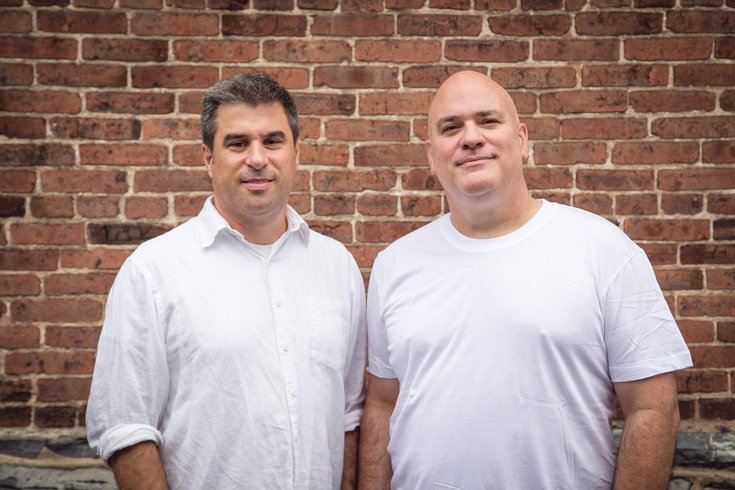
October 07, 2015
 Lancaster Food Company/for PhillyVoice
Lancaster Food Company/for PhillyVoice
Lancaster Food Company co-founders Craig Lauer (left) and Charlie Crystle (right).
Last year, longtime friends Charlie Crystle and Craig Lauer took a big leap by starting their own business. Crystle, a serial entrepreneur and advocate for accessibility to healthy food, and Lauer, a former brand strategist and lifelong foodie, formed The Lancaster Food Company.
But LFC isn't just selling organic breads, sunflower seed spreads and maple syrup. Crystle and Lauer created the brand to fulfill not only their mutual love of food but to support their local community. Both founders have a passion for good, healthy food and understand its impact on the economy. Thus, LFC's mission is to use organic, local food to create positive change in the city of Lancaster, which is deeply affected by poverty.
Crystle, the company's CEO, has plenty of experience both in starting a company and working with the community. He co-founded fundraising software GiftWorks and founded software company Chilisoft; he's also served on the boards of Assets Lancaster, Theater of the 7th Sister and Lancaster Community Garden.
Here Crystle discusses what LFC is doing to help the Lancaster community and why its mission is so important.
How does the Lancaster Food Company help fight poverty through its hiring practices?
We should establish that the city of Lancaster has a poverty rate of 30 percent and another 50 percent of the city isn't that much better off. We believe people deserve better than poverty pay, especially when they put in a day's work. That's what motivated us to start the company. This is a way we can directly impact people.
First, we specifically recruit people who live at or below the poverty line and enlist community partners to refer good candidates to the company. Next, we pay $14 for entry level work; that's our minimum wage and we're adding healthcare next month. Finally, we are setting aside up to 30 percent of the company for employees, so they can share in the wealth they help to build. This will be in the form of an employee stock option plan, and we expect to have it by the beginning of 2016.
What inspired you and Craig to focus your business on giving back?
We feel poverty is unacceptable in a society as wealthy as the United States, completely preventable and deeply damaging to our community. We also believe that in Lancaster, poverty is partly a choice of employers, not the employees to whom they pay poverty wages. We encourage them to find a way to do better.
What can everyday people do to fight poverty in their hometown?
Buy local. Support companies that pay a living wage and don't support the ones that pay less than that. Hire outside your comfort zone. Give second and third chances. Get to know people in poorer neighborhoods. Invest in companies trying to make change. Invest in entrepreneurs from poorer neighborhoods. Pressure your hospitals, governments and nonprofits as well as for-profit businesses to pay livable wages. Employers can share ownership.
What advice would you give to other business owners who may be unsure of how to improve their community through their work?
They should talk to their local Sustainable Business Network and look at bealocalist.org to start. They can ask themselves how they can impact community through every dollar they spend, every employee policy they make, every product or service they make or sell. Can I source this locally? How does this affect the community? Who can I help to mentor? Who can I invest in? Do I treat my employees fairly? What's fair?
Why is creating responsibly sourced food important to you?
Businesses can choose to have a positive impact in everything they do. It's a very powerful idea once you understand how far a dollar goes down the supply chain and what that dollar can trigger, both negatively and positively. We want to support sustainable agricultural practices because we value people's health and value our environment, both here in Lancaster and other places where we source ingredients.
What’s the biggest challenge you face as a local-focused, organic business?
We love Lancaster County organic produce, so we’ve been developing a number of products to take advantage of the seasonal abundance with small batches. This summer we released our first salsas and sold out pretty quickly, and we’re about to release a limited edition organic strawberry jam from this season’s local crop. We really love buying from local farmers regularly (through the organic farmers co-op Lancaster Farm Fresh ) to help the local organic agriculture economy.
What does being a ‘fearless leader’ mean to you?
It's meaningless, [because] fear is a regular part of being a startup in the grocery food business. It's a tough business with thin margins, so it's really tough to get enough traction to survive. We've been fortunate so far, but we know nothing's guaranteed and we're grateful to our stores and customers for helping us grow into what's a pretty ambitious vision.
Lancaster Food Company's products are available in the Philadelphia area, Brooklyn, Delaware, Washington, D.C. and Maryland as well as many Pennsylvania cities.